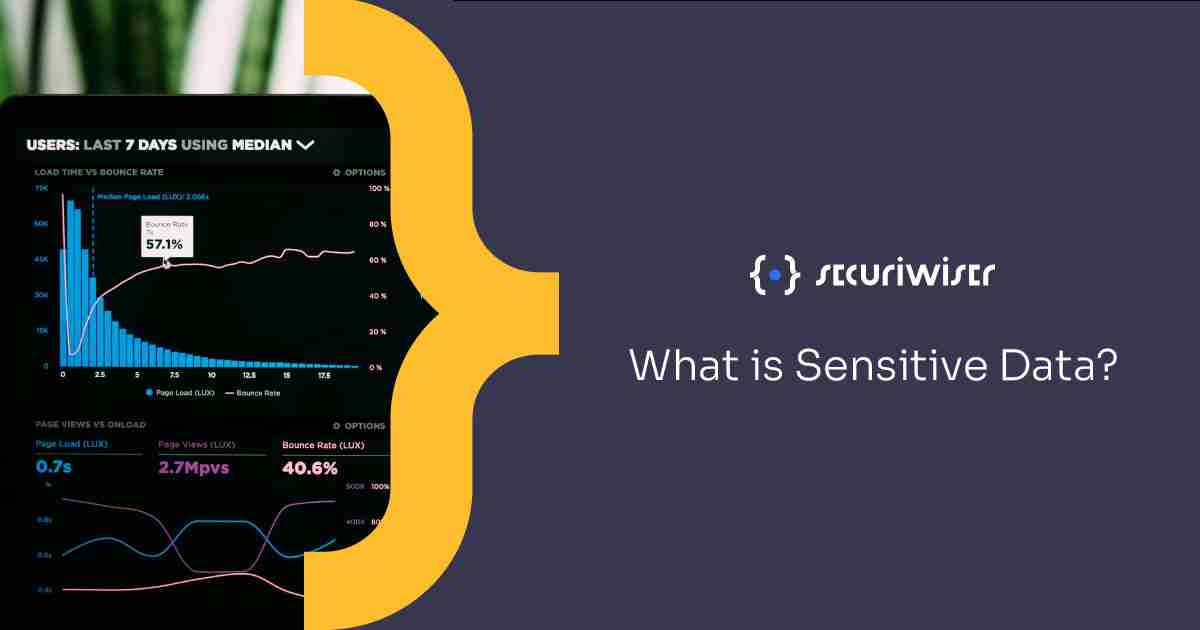What is Sensitive Data?
Blog / What is Sensitive Data?
3 MIN READ

Data is everywhere. Many businesses collect data from customers and use it to provide more targeted services. However, not all data is created equal. There are different types of data such as sensitive data which have different uses and regulations for handling them.
Sensitive information is confidential data that must be kept secure and out of the hands of anybody who does not have authorization to see it. As a result, access to it should be limited to only certain personnel within your company and kept secure to prevent data leaks and data breaches.
In recent years, there has been an increased regulatory scrutiny over how companies handle sensitive data. Organisations and firms need to have in place procedures that processes and handles data securely as well as manage third-party vendors and cybersecurity. Ignoring the aforementioned points could result in a business being fined up to $4 million.
What is classified as sensitive data?
All data containing the following elements, whether original or duplicated, is considered sensitive information.
- Personal information
- Protected Health Information (PHI)
- Education records
- Customer information
- Card holder data
- Confidential personnel information
- Biometric information
- Trade union memberships
What is personal data?
Personal information (or personal data) is information that can identify an individual. According to GDPR, this information can include a person's name, surname, phone number, social security number, or any other personally identifiable information (PII). This is different from anonymous data, or non-directly identifiable information, which doesn't enable direct recognition but allows human behaviour to be identified (such as the number of people visiting a website or their location).
How to measure data sensitivity?
A common way to assess and measure data sensitivity is to use the CIA triad model which assesses the confidentiality, integrity, and availability of that data. This well-known model allows you to analyse how the data would impact your organization or its customers if it was stolen or leaked.
What is confidentiality?
Confidentiality is defined as the state of keeping information private. Confidentiality concerns countermeasures that prevent unwanted access to sensitive information while ensuring the correct individuals may still access it.
These countermeasures vary from simple things like training employees on data security to having advanced cybersecurity practices in place like data encryption.
Examples of confidentiality countermeasures:
There are a range of countermeasures that firms and organisations can use to ensure data is kept secure. These include:
- Encrypting data
- Using password
- Authentication using two factors
- Using biometrics
- Keeping data on separate storage devices
- Only storing data as physical copy
How to Keep Sensitive Information Safe
The categorisation of sensitive information is the first way to maintain it. Various layers of security are necessary depending on the quality of the information. The important thing to remember is that not all data is created equal, therefore you should concentrate your data security initiatives on securing sensitive information, as outlined above.
Assessing what data you have and determining who has access to it is the first step toward successful data security. In order to identify possible vulnerabilities and cybersecurity threats, you must first understand how critical information flows into, through, or out of your business. You also need to know if any of your third-party and fourth-party vendors handle sensitive data.
This will enable you to understand how data goes through your business and provide you with a full picture of who submits personal information, who gets sensitive information, what evidence is collected, who stores the data gathered, and who has availability to the information.
What are the ramifications of unauthorised confidential information disclosure?
Data security is becoming increasingly critical. Personal data (PII) is protected by data protection laws in over 80 countries, which set limitations on how public and private entities can gather and use PII.
These rules compel businesses to inform individuals about what information is collected, why it is being gathered, and how the data will be used. Individual consent is essential under consent-based legal frameworks such as GDPR.
Under GDPR, all foreign companies who process the data of EU residents are required to:
obtain user consent for data processing inform users in the event of a data breach appoint a data-protection officer within their company anonymise data for privacy
How Securiwiser can help you protect your most sensitive data
At Securiwiser, we can protect your business from data breaches, identify all of your data leaks, and help you continuously monitor the security posture of your company. Click here to get access to FREE website security rating now!
Previous Article
6 Ways to Improve Your CybersecurityNext Article
What is a cyber-attack?How secure is
your school?
Blog categories
How secure is
your school?